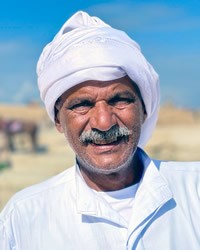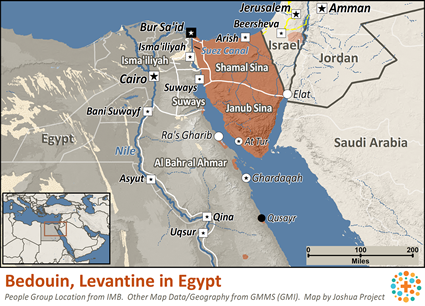The traditional homeland of the Bedouin Arabs is the Arabian Desert. Some Bedouin groups have migrated north into the Negev Desert region of Israel. Most are sheep and goat herders. The largest of these groups are the Banu Sakhr and the al-Huwaytat.
The Bedouin fall into two basic social classes. One class is known as the "true" Bedouin, and they live as nomadic shepherds. The other group has embraced farming and is known as the fellahin. The fellahin lead a more settled life on the edge of the desert. In contrast, the "true" Bedouin have been known for raiding any caravans that cross their path while journeying across barren deserts. They move into the desert during the rainy winter seasons and back to the desert's edge during the hot, dry summers. They speak Badawi, or as it is more commonly called, Bedouin Arabic. Well over a million of them live in Egypt.
In Egypt, the Eastern Bedawi Bedouins are sometimes involved in the tourist industry. They lead Western tourists on treks through the sandy desert and treat them to an enjoyable meal and campfire story telling. Others work for the Egyptian government, trying to keep Palestinian refugees from entering Egypt.
Those who are still nomadic live a harsh existence. They have no permanent homes, but live in portable, black tents made from woven, goat hair. The tents are divided by a decorative partition called a gata. Half of the tent is for the women, children, cooking utensils, and storage. The other half contains a fireplace and is used for entertaining. The women do most of the work, while the men socialize and make plans for the group.
The material culture of the Bedouin is limited. Their tents are their main possessions, and animals are very important for their nomadic lifestyle. Camels are their primary means of transportation, while sheep and goats are bought and sold.
Dairy products are the main food source for the Eastern Bedawi Bedouins. Milk from camels and goats is made into yogurt and butter. Most of their meals consist of at least a bowl of milk, yogurt, or rice. Round loaves of unleavened bread are served when available. Dates, which can be found in desert oases, are eaten for dessert. Meat is only served on special occasions such as marriage feasts, ceremonial events, or when guests are present.
To endure the extreme heat of the desert, the Bedouin wear lightweight, light-colored clothing. It is very loose-fitting, allowing for the circulation of air.
Although the Eastern Bedawi Bedouins once considered it degrading to have manual labor jobs, this has changed somewhat in recent years. Due to the need for better health conditions, more money, and better living conditions, some have accepted wage-paying jobs. However, most of them still despise this type of work.
The overwhelming majority of the Bedouin are Sunni Muslims. Islam has greatly influenced the lives of the Bedouin. For example, to preserve their people, the Bedouin are only allowed to marry those inside their own group. Also, the society is patrilineal, which means that inheritances are passed down through the males.
They agree with the theology of Islam, but on a daily basis, there are other spirit beings they look to for help. They pray to Allah in the sandy desert using a prayer rug, but later in the day they might do something to appease a spirit.
Evangelization efforts among the Eastern Bedawi Bedouins are challenging due to the unsettled nature of their lifestyle. There is a great need for workers who are willing to live in the harsh desert environment to reach them. That is difficult, but Muslim missionaries once did it, so it is not impossible.
Ask the Lord to call people who are willing to reach out and share the love of Christ with them.
Pray that God will raise up faithful intercessors who will stand in the gap for the Eastern Bedawi Bedouins.
Pray that their traditional Muslim culture will soften, creating open doors for the gospel to penetrate hearts.
Pray for the Lord to give dreams of the risen Christ to Eastern Bedawi Bedouin leaders.
Scripture Prayers for the Bedouin, Sinai in Egypt.
https://www.nationalgeographic.com/travel/article/egypt-trekking-with-bedouin-sinai-trail
https://www.middleeasteye.net/news/egypt-army-turns-sinai-tribes-prepare-influx-palestinians-gaza
| Profile Source: Joshua Project |


























